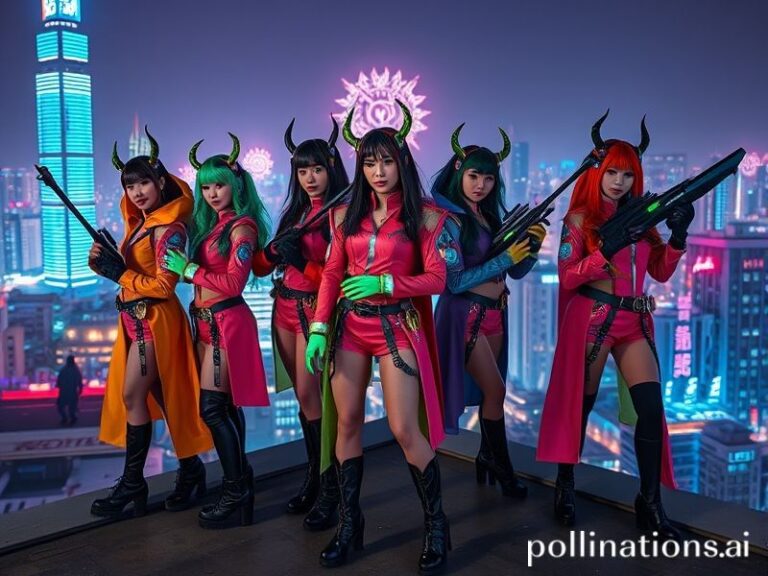Mario at 40: How a Moustachioed Plumber Quietly Became the World’s Most Valuable Export and Accidental Diplomat
TOKYO—In a cramped conference room high above Shibuya Crossing, where pedestrian herds jay-walk in perfect, pixelated choreography, Nintendo’s stock ticker flashed emerald green. The occasion? The 40th anniversary of a short, mustachioed Italian plumber who has never actually fixed a pipe. Instead, Mario Mario—yes, that redundant baptism is canon—has spent four decades hopping over geopolitical fault lines, flattening global recession anxieties under the comforting thud of a Goomba’s flat skull.
To the untrained eye, he’s merely nostalgia in dungarees. To the IMF, he is a quiet, $38-billion-a-year export economy disguised as a children’s toy. Last year alone, Mario outsold Italian olive oil, German small arms, and, rather gallingly for the British, the Beatles’ entire back catalogue. When central bankers in Frankfurt debate inflation hedges, some now mutter “Mario coins” the way their grandparents once whispered “Swiss francs.”
Genocide of turtles aside, Mario’s real triumph is diplomatic. In 1985, when the Cold War still had that fresh-nuclear-winter smell, American kids were blasting Soviets in “Missile Command” while Soviet kids quietly pirated “Super Mario Bros.” on Dendy consoles. The Berlin Wall fell; the Mushroom Kingdom remained. Today, Russian speed-runners and Ukrainian modders share Twitch chats where the only red flags are literal—warp pipes, not hammer-and-sickles. If that isn’t soft power, then neither is McDonald’s, and we all saw how that ended.
But the world has grown darker, and Mario—eternally 26, perpetually rescuing a monarch who clearly owns neither competent security nor a basic Toad HR department—has adapted with the subtlety of a chain-chomp in a china shop. “Super Mario Bros. Wonder” now drops our hero into a pastel fever dream where flowers sing and capitalism is literally a talking badge named Captain Toad. Critics call it whimsy; cynics call it the late-stage dopamine drip required to pacify a planet googling “how to survive heat dome.”
Meanwhile, Universal Studios’ Super Nintendo World franchises—in Osaka, Hollywood, and soon Orlando—sell $75 plastic power-up bands that let tourists collect pretend coins while standing in 90-minute queues under actual blistering sun. The irony is not lost on climate scientists, who note that each band’s RFID chip required rare-earth mining that probably killed a real turtle somewhere in the Congo. Still, visitors exit grinning, because nothing salves existential dread quite like a photo with a mute Japanese actor in a seven-foot Bowser suit who smells faintly of gin and despair.
In Latin America, where inflation can spike faster than Bullet Bill, bootleg Mario merch functions as a parallel currency. A sticker pack in Bogotá buys two bus rides; a knock-off plushie in Lima covers a week’s school supplies. Economists call it the “red-capped peso” and debate its velocity versus the bolívar. Mario himself would shrug; he’s been collecting worthless coins since 1981 and still shows up to work every morning in dungarees, no 401(k) in sight.
The plumber’s most subversive act, however, may be demographic. Japan’s population is shrinking faster than a shy-guy under a spotlight, yet Mario stubbornly refuses to age. He is the nation’s Peter Pan, a pixelated rebuttal to demographic destiny. Salarymen on the Yamanote Line clutch Switch consoles like rosaries, chasing 1-Ups while their pensions evaporate. In that context, Princess Peach isn’t a damsel; she’s the illusion of continuity, eternally baking a cake just out of reach.
So, as the Nikkei closes and Tokyo’s neon hums its electric lullaby, Mario hops onward—over supply-chain snarls, semiconductor shortages, and whatever fresh geopolitical lava pit tomorrow erupts. He collects coins we cannot spend, stomps enemies we cannot name, and offers, in lieu of solutions, the fleeting mercy of invincibility stars.
In a world whose pipes are irreparably broken, perhaps a plumber who never plumbs is exactly the hero we deserve—tapping bricks, chasing shadows, whistling that infernal tune while the planet burns gently in the background.







